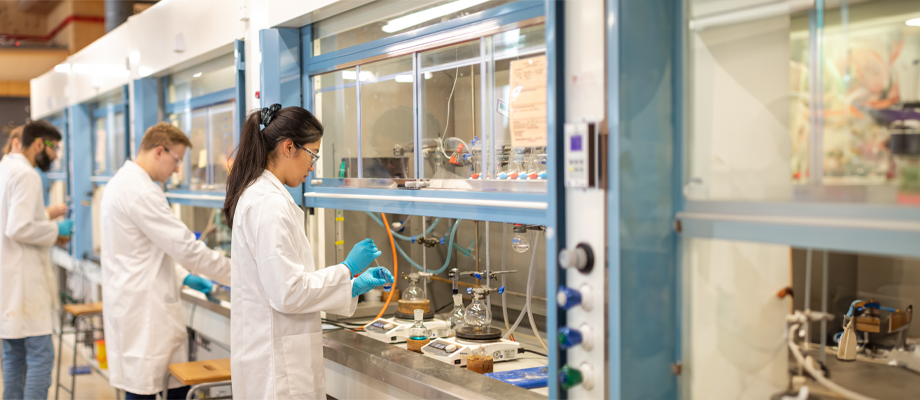
University secures five centres for doctoral training as UK invests £1 billion in next generation of innovators
March 13th, 2024
The university has been awarded five centres for doctoral training (CDTs) by the Engineering and Physical Sciences Research Council (EPSRC).
The centres are part of an unprecedented £1 billion investment in the UK’s engineering and physical sciences doctoral skills, announced by Science, Innovation and Technology Secretary Michelle Donelan.
The award of five CDTs across various disciplines underscores the university’s commitment to excellence in research and innovation, and its dedication to training the next generation of researchers. Between four and five cohorts of doctoral students will be trained over the over next eight years and help the UK tackle large-scale, complex challenges and benefit society and the economy.
The university will lead a CDT in Resilient Chemistry, in partnership with Nottingham Trent University, and co-lead on four CDTs, which are focusing on engineering and pharmacy and led by other institutions.
Professor Tom Rodden, Pro-Vice-Chancellor for Research and Knowledge Exchange, said: “As a university, we are immensely proud to have secured five new centres for doctoral training. This accomplishment underscores our commitment to fostering cutting-edge research and providing unparalleled opportunities for the next generation of researchers and innovators”.
The five CDTs are:
CDT in Resilient Chemistry: Feedstock to Function (CDT-F2F) is a renewal of a current and successful CDT which will be led by UoN, in partnership with colleagues from Nottingham Trent University.
Professor Pete Licence, project lead and Director of the CDT, said: “I am thrilled to be selected to lead the EPSRC CDT in Resilient Chemistry, which will train multidisciplinary scientists and engineers to deliver truly sustainable solutions to some of the chemicals industries biggest challenges, from Feedstock to Function. In partnership with research leaders from around the world we will attack some of society’s biggest challenges including synthetic fuels, renewable polymers and next generation battery materials to secure jobs, productivity, and growth.”
The Resilient Chemistry CDT forms part of the shared commitments under the Universities for Nottingham Civic Agreement, a collaboration between Nottingham’s two world-class universities and eight key anchor institutions, which sets out a shared commitment to working across Nottingham and Nottinghamshire for the benefit of our community, people and place.
BIONET (Bio-based negative emissions technologies) CDT is a new programme which will be led by Aston University with the University of Nottingham partnering as a co-lead.
Professor Hao Liu, Head of the Low Carbon Energy and Resources Technologies (LCERT) Research Group at the University of Nottingham, and Dr Eleanor Binner, Associate Professor of Chemical Engineering, will lead the University of Nottingham’s participation with the NET2Zero CDT.
Professor Liu said: “Over the past 15 years, the University of Nottingham has led several CDTs in the research areas closely related to those of NET2Zero CDT and conducted internationally leading research in bioenergy, carbon capture, low carbon fuels and chemicals, and greenhouse gas removals. Funding for the NET2Zero CDT will provide more opportunities to UoN academics to supervise high calibre CDT students and deliver inspiring training modules in negative emissions technologies and sciences.”.
Innovation for sustainable composites engineering CDT is a new programme which will be led by the University of Bristol with UoN partnering as a co-lead.
Dr Lee Harper who is the Nottingham lead for the CDT said “Composite materials are crucial for delivering a net zero future, but there is currently a distinct lack of skills to produce, design, and deploy sustainable composite products. I’m looking forward to continuing our long-term partnership with the University of Bristol to advance the knowledge and science that will create innovative leaders, capable of unlocking the full potential of composite materials to secure UK competitiveness.”.
DigitalMetal CDT is a new programme which will be led by the University of Leicester with UoN partnering as a co-lead.
Professor Tanvir Hussain, an EPSRC Research Fellow, who is the UoN lead for the CDT said: “The metal and manufacturing sector is crucial to the UK economy and plays a vital role in the Midland’s regional employment. This CDT will meet the urgent national and strategic need for future researchers and engineering to lead digitisation of the products and processes to enable defect-free, right-first-time innovation, and implement transition to net zero in this hugely important sector. The CDT will train a diverse cohort to build world-class research and training base in the UK.”
CDT in Accelerated Medicines Design & Development is a renewal of a successful CDT for which the leadership revolves between UoN and University College London (UCL). For this iteration UCL will be leading the programme with UoN partnering as a co-lead.
Professor Snow Stolnik-Trenkic, UoN lead and Co-Director for the CDT, said “The critical role of mRNA vaccines in recent years has shown how important pharmaceutical science is to global health. This EPSRC funding will educate a new generation of researchers equipped to lead future translation of potential new drugs into medicines accessible to patients.”
Comments are closed.
Other

Need news? See you on SharePoint
After 14 years of service, Campus News is being retired as the university’s staff news platform. […]

Roads and car parks closed for refurbishing work
As part of ongoing road improvements at the university, works will be taking place to resurface […]

